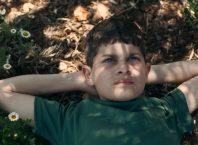Nature and culture meet as the Arava International Film Festival presents a rich and diverse program of international and Israeli films shown on a giant screen under the night sky. Now in its 10th edition, the festival will take place near Zuqim, in the Ashush Natural Reserve, in the Arava region of the Southern Negev, from November 3 – 13, 2021.
The program is bountiful, I’ve had the opportunity to preview several films that I very much recommend: Radu Muntean’s Întregalde; Lorenzo Vigas’ The Box; Valdimar Johansson’s Lamb; and Jacques Audiard’s Paris, 13th District.
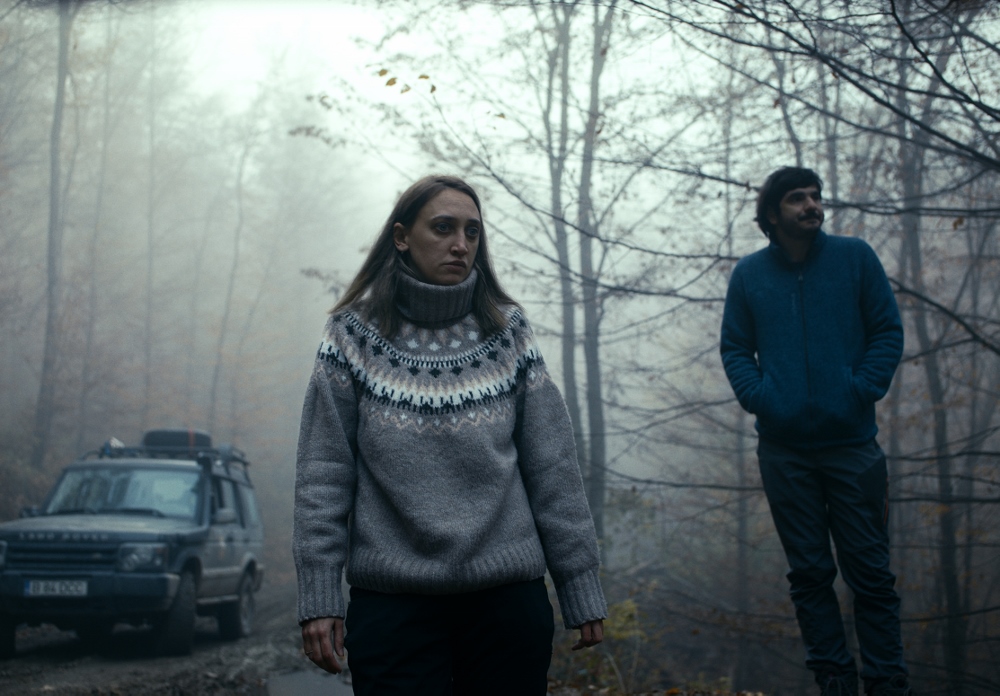
A very different landscape may be seen in Radu Muntean’s Întregalde, a film set near the town for which it’s named, in the Carpathian Mountains of Romania, a rural area where wolves, bears, and wild boars roam the woods. Muntean focuses his gaze on the humans, specifically, a group of volunteers from Bucharest, who have come to the region every year at Christmas time to distribute bags of food and necessities to the needy residents. His keen observation of character and relationships results in a riveting film, whose social critique is conveyed through sharp banter, physical comedy, illuminating conversations, creative cinematography, and a riff on horror films.
Întregalde opens in the noisy, cheerful, bustle of people packing big sacks of food. Amid the chaotic scene is a conversation between a young girl and her mother, a moment so small that it might even be missed, but that serves as a fitting prologue to all that is to come. Ina has found a puppy, but Cristina (Carmen Lopăzan) refuses her, saying “How often have I told you we can’t adopt strays.” Although Ina tries again, saying, “but he has feelings too,” Cristina’s adult reasoning prevails. Maria (Maria Popistasu), another volunteer, tries to comfort Ina by giving her some food for the puppy. Compassion for one’s fellow creatures and altruism are fine, within carefully defined limits; and Maria has a kind heart.
As the caravan of 4-wheel vehicles makes its way through the mountain road, Maria is in the back seat of Radu (Radu Muntean) and Cristina’s car. Much of the film takes place inside cars, yet the conversations are so riveting (thanks to a lively and precise script written by Muntean, Razvan Radulescu and Alexandru Baciu), and the camera angles so dynamic that it never feels static. Radu gifts a local girl with an iPad, a device that may open new vistas and opportunities for her, yet Cristina argues that the one-time gift will also emphasize all that she does not have, and create desires and expectations that lead to disappointment.
When Dan(Alex Bogdan) and Ilinca (Ilona Brezoianu) drive by with room in their back seat, Maria joins them, glad to get away from Radu and Cristina’s bickering. Little does she know what lies ahead. En route they stop and Dan buys a sheep from a farmer who will butcher it for the group’s barbecue later on. Who says you can’t do good and have fun too?
As the three drive along, they come across an old man walking along the road, who tells them his feet hurt, and at Maria’s urging, they give him a ride. Dan is rude and impatient, his commentary adds a comic transgressive pleasure to the film, and his concern for his car provides yet another layer of humor. Kente Aron, the old man, is wonderfully portrayed by Luca Sabin, a non-professional actor. His wrinkled visage and open smile are enchanting; his endless stream of conversation however, becomes hard for the trio to take. When he directs them to take an alternate path, and their car gets stuck in the mud, it’s the beginning of an adventure that exposes the tensions underlying their friendship, and the different perspectives they have on mutual responsibility.
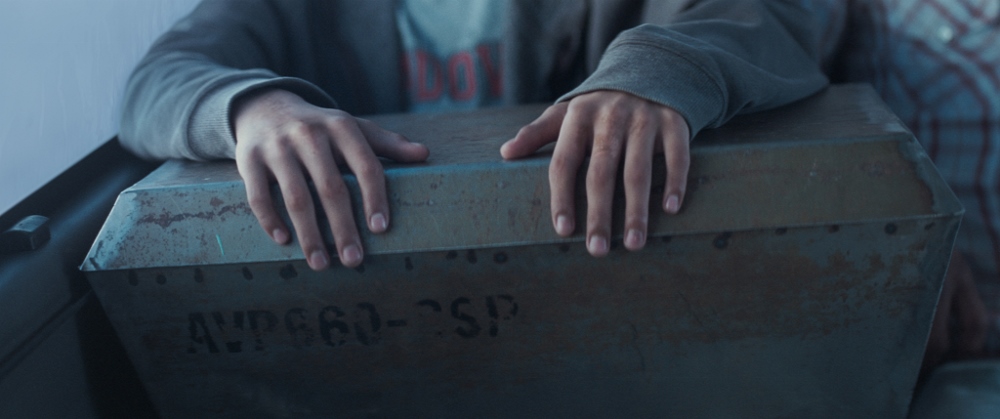
Lorenzo Vigas’ film The Box relates to themes of responsibility as well, both collective and individual. Set in Mexico, it’s a coming-of-age narrative that resonates with strong social critique. The film focuses on Hatzín Leyva, a young teen who is tasked with a responsibility no one his age should ever have to undertake. His mother is dead and his father long gone and he lives in Mexico City with his grandmother, who is not well. Hatzín Navarette delivers a powerful performance as the young Hatzín, whose expressive visage reflects all that he feels, yet does not say.
The film opens with the harsh sound of Hatzín’s feet pounding the wall of the toilet with all his pain and rage. He’s on a train bound for a remote mining town to collect the remains of his father Esteban, whose body was exhumed from a mass grave. Surrounded by people waiting and weeping for their lost loved ones, he appears outwardly calm as he hands over the documents to the clerk. Yet when he is given the box, along with an ID that was found with the body, one can see the turmoil of emotions seething beneath the surface. As he rides the bus on his way home, he notices a man who closely resembles the photo on the ID. The possibility that this man is his father gets Hatzín off the bus, and calling out his father’s name, Esteban, to the man. The man (Hernán Mendoza) claims Hatzín is mistaken, he is not Esteban, he is Mario Enderle. Yet Hatzín is not convinced, and he returns the box at the site of the mining accident, telling them a mistake has been made in identification.
Hatzín’s determination to pursue the man who calls himself Mario speaks of a deep inner need, one that perhaps Hatzín had not even been aware of feeling. He stays in town, sleeping rough, and tries to track the man down. When he finds him, telling Mario “I remember you”, but Mario repeatedly denies him. Despite the man’s rough rejection, Hatzín remains obsessively resolute. Is this stranger Hatzín’s father, or does he see Mario through the illusive gaze of his need to fill that void? It’s impossible to know. Although he continues to deny the paternal connection, Mario eventually lets the boy tag along with him to work, and gives him a place to sleep.
Mostly silent and observant, Hatzín is revealed to be intelligent and curious, and very eager to please. Yet Mario may not be the best male role model to emulate. Seen from Hatzín’s perspective, whose gaze takes in every detail, the viewer soon realizes that Mario, who supplies workers to factories, is not the benevolent boss he appears to be. The factories are sweatshops, requiring long hours of work for little pay; amounting to something more like indentured servitude than employment. As the connection between Mario and Hatzín grows, so does his awareness of Mario’s morally, and criminally, reprehensible actions. Hatzín’s struggle is riveting, as he is torn between conflicting feelings. His desire to belong, to have a father who cares for him and to be a son who will make his father proud, is in conflict, not only with his anger at his father’s abandonment, but his growing awareness of the kind of man this father – whether biological or not – has come to be. The film is produced by Michel Franco, who will be a guest of the festival with his new film Sundown, starring Tim Roth and Charlotte Gainsburg.
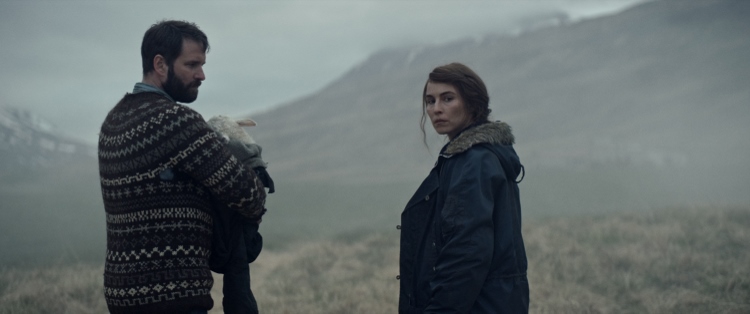
Family and the relationship between parent and child are also at the center of Valdimar Jóhannsson’s Lamb, although the tone and narrative of this film is as far from The Box as Iceland is from Mexico. Evoking the dark tone of folktales, Maria (Noomi Rapace) and her partner, Ingvar (Hilmir Snær Gudnason), are hardworking farmers, leading a very silent, solitary life. They are grieving the loss of a child, and the film, much as in the ancient tales, offers what appears to be a magical healing to their sorrow. Around Christmas time, one of their ewes gives birth to a creature who captures Maria’s heart. The couple takes in the newborn, calling her Ada, and raising her as their own.
Maria’s fierce mothering is fascinating to observe, Rapace gives an excellent performance, wordlessly conveying the depths of the character’s feelings. In the relationship between humans and the natural world around us, we often seek to benefit without much thought to the consequences for other living beings and the environment. So does Maria take this unexpected gift from nature, without even seeming to pause to consider the repercussions of her actions for others. Ingvar and Maria raise young Ada in contentment.
Jóhannsson draws out the suspense, revealing Ada to the viewer about 40 minutes into the film. The amazing result was achieved through painstaking shooting with children and puppets, augmented by CGI. Ada is compelling, and the film’s matter-of-fact approach to the extraordinary leads the viewer along, much as one accepts the magical events of a fairy tale. Yet this pastoral family scene is disrupted by the arrival of Ingvar’s brother Pétur (Björn Hlynur Haraldsson), a not-so-successful musician, who turns out to have a past with Maria. His arrival marks the first time an outsider is confronted with Ada, and his presence raises underlying tensions to the surface. Much remains mysterious in this film, even after the dramatic finale, and that is its allure.
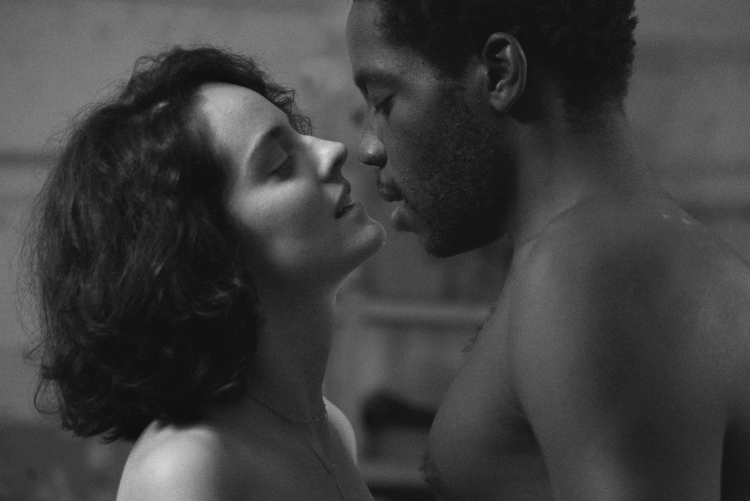
In Paris, 13th District (original title Les Olympiades), Jacques Audriad (The Sisters Brothers) casts a frank, yet romantic gaze on thirty-somethings figuring out life among the 70s-era high rises of the neighborhood. Shot in black and white, the shades of gray evoke a romantic feel to the intersecting stories of the central characters. Yet the other aspects of the film contribute to a tone that is edgy, direct, and replete with wry humor. The script is penned by an impressive cohort – Audiard, Céline Sciamma and Léa Mysius – and based on a rather non-traditional source: short comic stories by American cartoonist Adrian Tomine, transposed to Paris. Emilie (Lucie Zhang) is a French-Chinese women stuck in a job she dislikes, who is hoping to cut down on expenses by finding a roommate. Her ad is answered by Camille (Makita Samba), who she assumed would be a woman, but when she opens the door to find the handsome teacher standing there, she overcomes her initial rejection fairly easily. Roommates and fuck-buddies, their relationship is predictably complicated, yet its development throughout the film is intriguing. Lucie Zhang is vivacious and enticing, creating an Emilie who is far more complex than one might imagine at first sight.
New to the neighborhood is Nora, a slightly older law student, who is portrayed by Noémie Merlant (Portrait of a Lady on Fire). Awkward and unsure of herself, Nora finds herself in a wretched predicament. Not only does she find it hard to connect with her fellow students, whose youthful arrogance and city-aloofness is foreign to her, but as it turns out, she bears an uncanny resemblance to Amber Sweet (Jehnny Beth), an internet porn star.
The different character’s trajectories connect and diverge around the neighborhood over the course of the film, as cinematographer Paul Guilhaume’s beautiful lensing makes it a pleasure to follow their uncertain steps and mis-steps as they search for sex, love, and a sense of their place in the world.
The full program, tickets and lodging information is available on the Arava International Film Festival website: https://www.aravaff.co.il/en
The Arava International Film Festival is the initiative of producer Eyal Shiray in cooperation with the Central Arava Regional Council. The festival is supported by the Central Arava Regional Council, The Ministry of Culture and Sport Film Council, Mifal HaPais, The Ministry of Tourism, and the Foreign Ministry. The festival is produced and directed by Eyal and Tinker Shiray, and under the artistic direction of Edna and Dan Fainaru.





